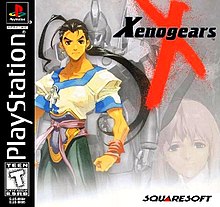| Revision as of 21:51, 6 July 2005 edit67.118.187.89 (talk)No edit summary← Previous edit | Revision as of 21:52, 6 July 2005 edit undo67.118.187.89 (talk)No edit summaryNext edit → | ||
| Line 5: | Line 5: | ||
| |designer = | |designer = | ||
| |engine = | |engine = | ||
| |released = ], ] (Japan), ], ] | |released = ], ] (Japan), ], ] (U.S.) | ||
| |genre = ] | |genre = ] | ||
| |modes = ] | |modes = ] | ||
Revision as of 21:52, 6 July 2005
1998 video game| Xenogears | |
|---|---|
 | |
| Developer(s) | Square Co., Ltd. |
| Publisher(s) | Square Co., Ltd., Square Electronic Arts |
| Platform(s) | PlayStation |
| Release | February, 1998 (Japan), October, 1998 (U.S.) |
| Genre(s) | Role-Playing Game |
| Mode(s) | Single player Limited two-player battle mode |
Xenogears (ゼノギアス Zenogiasu) is a role-playing game for the Sony PlayStation. It was released by Square Co., Ltd. in February 1998 in Japan and October 1998 in the United States.
In terms of popular opinion, Xenogears is one of the most divisive video games ever. Supporters of Xenogears believe that it ranks among the best examples of the computer role-playing game genre, with its relatively deep and well-rooted history involving politics, love, and religion, among others; detractors believe Xenogears has badly flawed game mechanics — among them, an excessively high rate of random battles and overly pedestrian and linear gameplay. Xenogears was notorious for its lengthy (to critics, tedious) cut scenes and backstory presentations.
Xenogears's story centers around Fei Fong Wong, a young man who has no memories of childhood and suddenly thrown into a conflict that will decide the fate of the entire world. The storyline is highly detailed, with references to a history that spans thousands of years. See Xenogears terms for references about the story.
Xenogears uses both 2D and 3D graphics: Characters are portrayed with traditional 2D sprites while the Gears (the mecha of Xenogears) and the backdrops use 3D techniques. Xenogears also uses traditional Japanese cel-animated scenes and pre-rendered CGI movie clips, a common trait in Square RPGs during the PlayStation era.
The music was composed and arranged by Yasunori Mitsuda. His musical score has been regarded as one of the strong points of the game for its impact on the storytelling. Aside from Mitsuda's official music, two other Xenogears soundtracks have been published: Xenogears: Creid and Xenogears Light (a fan-created arrange album).
Xenogears has a wide range of related merchandise, from both first and third parties. The most valuable and sought after is the Xenogears/Xenosaga universe's well-detailed book, Perfect Works. Perfect Works explains the story/history prior to Xenogears, that was left out in the game and is the basis for the Xenosaga games.
Around the same time as the game's early production, the anime Neon Genesis Evangelion was being produced. Xenogears and Neon Genesis Evangelion both contain copious and sometimes incongruous references to Judeo-Christian theology. Both are related to the work of Nietzsche, specifically in the battle between good and evil, the exploration of the self (The Id, The Ego and the Superego), and the balancing of power. Both Xenogears and Neon Genesis Evangelion also have strong Judeo-Christian Angellic references; Xenogears is specifically towards God.
A persisting rumor had it that Xenogears' release in the United States was impeded or delayed because of its religious references. There is no substantial evidence to back this up, however. In the game, the plot develops towards using religion as a form of controlling the masses of the people.
Xenogears is actually the fifth episode of a proposed series of six. Furthermore, there are hints that Xenogears was rushed in production; but there is no credited source. The major basis of such being the particular gameplay (or lack of it) found in the game's second disk where players watch the characters recap the story rather than play through it; though a good possibility also exists proposing that this was intentional (Evidence: The second disc of Xenosaga Episode II, Xenogears: Perfect Works). Rumors say that it was going overbudget, or beyond production schedule. Others say that Square lost interest and confidence in the financial value of Xenogears; as portrayed by the founding of Monolith Soft - a company which is mainly composed of ex-Square employees, most of whom worked on Xenogears. Monolith Soft has been developing a series of prequels to Xenogears, branded Xenosaga, which are published by Namco. These games take place many centuries before the events in Xenogears, but use the diagrams and mechanics outlined by Perfect Works. Xenosaga's relationship to Xenogears is unclear, as the rights to the earlier game are still held by to Square Enix (formed after the merger of Square with former rival Enix in 2003). The first two have already been released, with a third in development. Again, heavy emphasis is placed on religious themes and fundamental analyses of good and evil, as evidenced by their German subtitles that pull from the works of Nietzsche.
See also: Xenogears terms